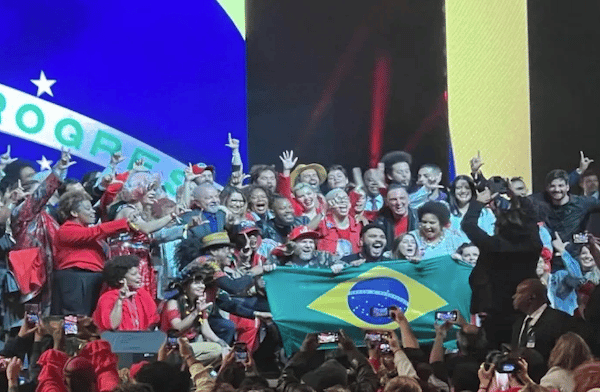Workers’ Party (PT) candidate, former president Lula da Silva, won the Brazilian presidency with just over 50 percent of the vote in the runoff election held on October 30.
Incumbent Jair Bolsonaro, a right-wing nationalist, received 49.10%.
Helping Lula achieve his narrow victory was the early support of alternate party candidates that came in third and fourth place in its election held on October 2, respectively Simone Tebet and Ciro Gomes, with 4% and 3%. While Lula prevailed on October 2 with 48.4% of the votes, a victory of over 50% is required to eliminate the need for a runoff election.
With a clear chain of ballot custody, the required presentation of government issued identification (ID), same-day voting at documented residential locations, site-specific paper tallies of ballots delivered in real-time (highly functional exit polls), no hackable internet connection for its electronic voting machines, open-source programming and no mail-in ballots, Bolsonaro’s repeated claims of election fraud remained unsubstantiated—even by the military that conducted an investigation at his urging in October during and after the first round of voting and found “nothing irregular.” Keep in mind Bolsonaro did not complain about the system when he was elected president in 2018.

Incumbent President Jair Bolsonaro [Source: vice.com]
Calling the military coup, a “defense of democracy,” he criticized the Brazilian military for “failing to finish the job.” Apparently, to Bolsonaro, the disappearance and killing of over 400 people were insufficient. Unlike Bolsonaro, Trump has no military experience and has a rocky road with U.S. Intelligence Agencies and the military.
Neither is former two-term President Lula da Silva similar to U.S. sitting President Joe Biden. Lula da Silva believes, “We have to make inequality a priority and not the spending cap.”
And Lula already succeeded in lowering Brazil’s poverty index by 20% during his two terms as president from 2003-2010 while also achieving economic growth. Lula left office with more than an 80% approval rate in public opinion polls, making him the most popular president in the country’s history.
In contrast, President Biden has lost the equivalent of 2 paychecks for workers per year in his single term in office due to devastating inflation rates. Real wages have decreased under Biden from September 2021- September 2022, putting Biden’s approval rate at 42%.
Foreign Boots on the Ground Journalists Validate Brazil’s Electoral System and Criticize the U.S.
What remains glaring to boots-on-the-ground journalists that observed the October 2 election—from the independent news media outlets The Convo Couch and Kawsachun News, and colleagues Danny Shaw and Micaela Ovelar, as well as this writer, CovertAction Magazine’s correspondent on location—are the repetitive and unmitigated shortcomings of the U.S. electoral system that stand in stark contrast to Brazil’s achievements.
Unlike Brazil, the U.S. electoral system is linked to the internet (hackable), runs on proprietary/closed source software (unverifiable), provides no summary paper ballot tallies (no localized written exit polls) And its localized verbal exit polls prove unreliable.
Thus, there is no tangible paper backup system to verify electronic electoral results. And the U.S. permits the use of mail-in and absentee paper ballots (which can lead to ballot harvesting/ballot box stuffing). To further complicate matters, in impoverished U.S. neighborhoods, polling sites are more limited, voting machines are often broken, and waits can be for hours. Since voting takes place on workdays, voters need to request time off from work. This is not an option for low-income voters with gig employment.
Unlike the U.S., voting in Brazil begins at age 16. It remains optional for those under 18 and over 70 but is compulsory for all others. Sliding scale fines are issued for non-compliance. Elections are routinely held on Sunday, which is the day most workers have off, and results are routinely issued within a few hours of the polls’ closing.
Geopolitical Importance of Brazil’s Election Results to the U.S.
The global south is not only a powerful supplier of strategic and rare earth minerals as well as a producer of key industrial and agricultural inputs, but it is also a huge market for U.S. finished goods, technology, and financial services. Within this context, Washington views the global south’s relationship with Russia as a zero-sum game as it does with Africa, Asia, and the Mid-East.
Matter of fact, the Rand Corp, an influential Washington think-tank, outlines in their report the methodology needed to destroy Russia by overextending it militarily to ruin its alliance with other countries. However, the unipolar world based on U.S. hegemony has been morphing into multipolarity rapidly since February 24, with Russia’s stated mission to “denazify and demilitarize Ukraine.” Despite billions in U.S. arms transfers and co-opted news media, Africans and Haitians wave Russian and Chinese flags.
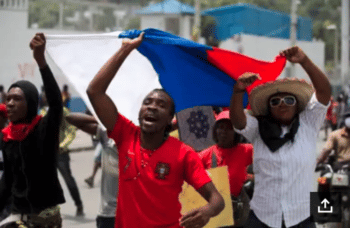
Haitian Protestors Hold Russian Flag During Demonstration. [Source: gannet-cdn.com]
Using its leadership in the global south, Brazil seeks to spearhead the creation of a Latin American currency called the Sur (south). It will join alternate financial systems and currencies already in use for trade, such as the Chinese CIPS/Yuan/RMB and Russian SPFS/Ruble—which already chip away at the SWIFT/dollar transactional system and the U.S. economy.
Not only does the petroyuan remain a threat to the petrodollar in the global oil market, but expanding U.S. unilateral economic coercive measures (sanctions) against Russia and China, and Iran and Venezuela (two major oil-producing countries), and approximately 37 other countries have backfired economically—making the ruble the strongest currency in the world this year according to CBS News.
But it gets even worse for the U.S. Its proxy war against Russia through Ukraine and Europe/NATO has put the rollout of these competing alternative transactional systems into hyperdrive.
BRICS
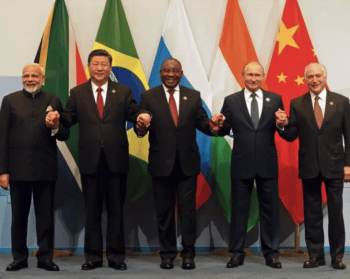
Leaders’ group photo on the sideline of the 10th BRICS Summit in Johannesburg [Source: chinadialogue.net]
“As the BRICS Chair this year, China actively supports the process of BRICS expansion,” said Foreign Ministry spokesperson Wang Wenbin during his regular briefing on October 30 in response to Russian President Vladimir Putin’s statement that Russia supports the accession of Saudi Arabia to BRICS.
Sao Paulo, Latin America’s Largest Industrial City
Within Brazil, Sao Paulo is a state and city. In the U.S., New York is both. However, San Paulo is the largest industrial city in Latin America and New York City is the second largest manufacturing city in the United States. The state of Sao Paulo has a population of over 22.4 million, and the city over 12 million. For perspective, New York State has a population of over 20 million, and the City of New York has nearly 9 million.
Based on scale and complexity, Sao Paulo offered us, foreign journalists, a diverse city from which we could glean a solid overview of Brazil’s electoral system. Also, it enabled us to have access to high-level electoral government officials.
After reviewing our press credentials and passports, it’s Regional Electoral Court of Sao Paulo (TRE-SP) provided us with TRE-SP credentials that would enable us to have unfettered access to polling sites across the city/state, and they agreed to allow us to return to conduct a formal interview with a translator.
After a two-hour videotaped interview, where we mercilessly grilled Eliana Passarelli, Secretaria de Comunicacao TRE-SP, on every detail of the system to our satisfaction, we mapped out a course to view polling sites in affluent, working-class, and impoverished neighborhoods.
In short, we discovered in conducting numerous interviews that Bolsonaro was a favorite in affluent neighborhoods, and Lula was a favorite among students, most working-class, and the impoverished. The exception was that some wealthy voters disliked Bolsonaro because his anti-environmental and pro-agribusiness policies are destroying the Amazon.
Some working-class voters disliked Lula because he was jailed as a criminal in a bribery scandal dubbed Operation Car Wash. Even when we explained that the charges against Lula were politically motivated to preclude him from running against Bolsonaro in 2018 and that Lula was acquitted in June 2021, taxi drivers remained unconvinced. A lie travels around the globe while the truth is putting on its shoes.
Voter Disenfranchisement in Communities/Favelas
The only similarity between Brazil and the U.S. appears to be voter disenfranchisement.
On election day, to slow or stop voters from casting ballots in Lula stronghold (the northeast region in Brazil), police blocked traffic while transportation companies that were supposed to be free on election day were charging fares.
Due to the location of impoverished communities (formerly known as Favelas) on the city’s outskirts, voters are generally required to take a bus or car ride to their designated polling site. This distance is prohibitive to many residents due to financial constraints. Also, we learned that many residents don’t have identification papers due to property losses sustained through water and fire damage to their homes.
Additionally, a resident explained that it is time-consuming and costly to obtain replacements. Lastly, we learned that many community residents do not read or write because transportation costs are too expensive, and solo travel on foot makes children vulnerable to criminal elements.
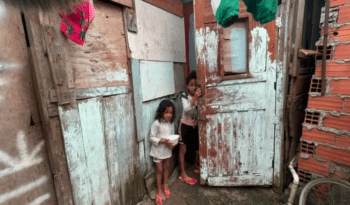
Cidade Triadentes Guaianases Children Holding Food Served by MST [Source: photo by Lauren Smith]
As a result of these factors, community organizers with the Landless Workers Movement (MST) explained that only approximately 30% of community residents vote. The poverty rate increased so precipitously under Bolsonaro that the government doesn’t enforce penalties against its community residents for not voting.
Survival in these communities is precarious as they are sited in locations largely considered unbuildable, such as flood zones. Overall, residents lack potable water, sanitation facilities, and electrical service. Just getting ready to attend work or school is a struggle and inordinately time-consuming. Mostly, homes are built using substandard construction methods and makeshift materials unsuitable for exterior use, such as particleboard, cardboard, and wire.
Thus, most homes are subject to water and fire damage and more easily collapse in storms and earthquakes than those with cinder block walls, mortar joints, and steel roofs. Some residents have tapped into water and electrical lines to obtain some jerry-rigged service, but all waste goes into an adjoining open sewage creek which makes residents and animals more vulnerable to disease.
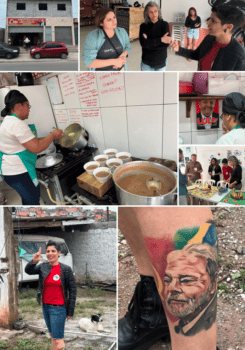 Community members overwhelmingly support Lula and the programs he instituted to assist them. According to a study by several nonprofit organizations, including Oxfam, thirty-three million Brazilians went hungry from November 2021 through April. In contrast, from 2003 to 2012, the poverty rate dropped from nearly 40 percent of the population to under 20 percent with Lula’s Bolso Familia program.
Community members overwhelmingly support Lula and the programs he instituted to assist them. According to a study by several nonprofit organizations, including Oxfam, thirty-three million Brazilians went hungry from November 2021 through April. In contrast, from 2003 to 2012, the poverty rate dropped from nearly 40 percent of the population to under 20 percent with Lula’s Bolso Familia program.
We spent some time at Academia Carolinas an educational center, community gathering space, and soup kitchen run by the MST at the Cidade Triadentes Guaianases (an hour’s drive from central Sao Paulo). They treated us to a delicious meal cooked with locally grown organic produce. Our host from MST was Simone Rego, and our chef was Rosana Oshiro. Rosana, an expert in Permaculture, frequently cooks at the center. Academia Carolinas provides food to community members once per week.
Food sovereignty, along with political engagement and literacy are key goals, as well as land reform, for the Landless Workers Movement. For approximately two decades, the MST has led more than 2,500 land occupations, with about 370,000 families that settled on 7.5 million hectares of land. Currently, there are approximately 900 encampments supporting 150,000 landless families in Brazil.
The net result is that if more community members had access to voting, Lula’s winning margin would be significantly higher.
Prior to the Election
The machines are loaded manually with a memory card at a central location, and they are deployed to the polling sites. There is an extensive chain of custody with multiple electoral officials certifying and signing off at each stage in the process of uploading the candidates for president and for the various governors, senators, and congresspeople, as well as for state and district representatives.

TRE-SP Headquarters. Electronic Voting Machine [Source: photo by Lauren Smith]
Day of the Election
On the morning of the election, Craig (Pasta) Jardula from the Convo Couch verified in Colegio Dante Alighieri, a private school located in an affluent area, that the voting machines were zeroed out and contained the proper presidential candidates.
Fiorella Isabel Mayorca and I observed Lula cast his ballot at Escola Estadual Joao Firmino, a working-class neighborhood.
We then met up with Pasta in a community/favela to accompany two young women on their journey to vote. It was a ten-minute car ride from their homes to the public school that served as their voting site.
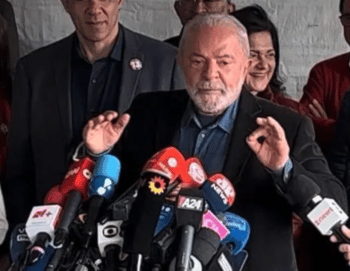
Escola Estadual Joao Firmino Lula Addressing the Press After Casting His Vote [Source: photo by Lauren Smith]
Voting Tallies, Collection of Results and Equipment
After the voting process, we returned to the private school visited by Pasta prior to the casting of ballots and witnessed the tally sheets as they were being printed from electronic voting machines. Since the private school is in an affluent neighborhood, we anticipated that Bolsonaro would lead in the tallies, and this was the case.
Each electronic voting machine produced five copies of the ballot tally. Tallies are distributed along with the memory cards and the electronic voting machines back to a central location. Paper tallies are posted outside the door of each classroom/Secao (voting section). Party representatives take photos of the tallies and report back to their central offices. In Brazil, even exit polls are even scrutinized in real-time.
Conclusion
While election integrity should be a bipartisan concern that cuts across team sports party lines, especially as the U.S. prepares for mid-term elections on November 8, it isn’t. Democrats mainly focus on voter disenfranchisement, and Republicans primarily focus on the need for voter IDs and the unverifiability of mail-in and absentee ballots that can be subject to ballot harvesting/ballot box stuffing. While both sides of the duopoly present significant concerns, all electoral deficiencies matter and collectively constitute willful neglect at the national and state level across the United States. Considering the fact that Brazil is a developing country, and the U.S. is the number one richest nation, its electoral failures are even more poignant.

